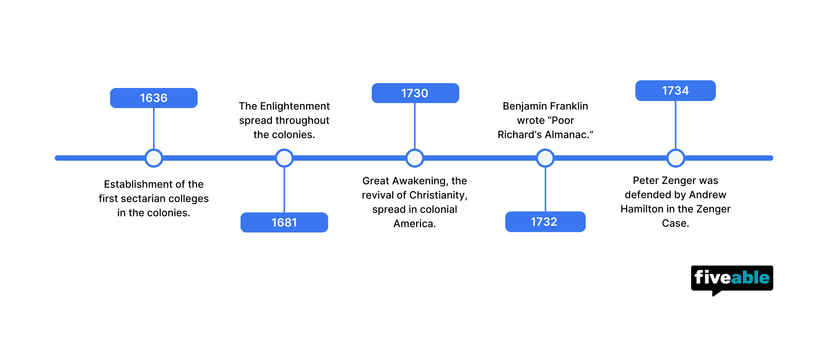Topic 2.7

📍Topic 2.7 Colonial Society and Culture
📖 AMSCO p.63 - p.74
Main Idea
⭐ The colonies were characterized by groups of immigrants seeking freedom or compelled to relocate as slaves. Within the New England, Middle, and Southern regions, distinct sources of livelihood emerged, shaped by the diverse natural resources at their disposal. Beyond economic differences, these colonies diverged from their host country in terms of religious tolerance and the absence of an aristocratic class. Notably, colonies prioritized the development of education systems and avenues for self-expression, contributing to the emergence of The Enlightenment. This intellectual movement advocated for the pursuit of scientific reason to expand individual rights, challenging the prevalent reliance on divine intervention in daily life.
Key Timeline

Timeline of Key Events in ****1607-1754
Image Courtesy of Samhitha
Things to Know
European Immigrants:
- English: Settled throughout American colonies. Their population numbers are smaller than other groups due to less conflicts faced in England.
- Germans: Settled in an area known as Pennsylvania Dutch country, maintaining their customs and obeyed colonial laws.
- Scottish-Irish: Protestants whose ancestors moved from Scotland to Ireland. They didn’t like the British, who forced them to leave Ireland. Many settled in western Pennsylvania, Virginia, the Carolinas, and Georgia.
Africans:
- Largest group in the English colonies.
- Were forced onto ships
- Working as laborers, bricklayers, or blacksmiths.
- Mainly lived in Southern colonies, such as South Carolina and Georgia.
- Slaves were freed, which was rare, by buying their freedom or being emancipated by plantation owners.
Native Americans:
- Some native Americans protected their land through alliances with other tribes.
- Others became allies with settlers to fight rival tribes.
Liberty and Opportunity:
- Religious Tolerance
- Permitted practicing different religions, but not on an equal base of freedom.
- Social Mobility
- White settlers were able to improve their lifestyle by acquiring land.
Economy:
- New England colonies
- Primarily earned through logging, shipbuilding, fishing, trading, and rum-distilling.
- Subsistence farming: Harvesting crops only to feed oneself.
- Middle Colonies
- Known as the “bread basket” colonies, they exported wheat and corn to European countries.
- Southern Colonies
- Established plantations that primarily grew tobacco, indigo, and cotton.
Great Awakening:
- Movement that emphasized religion and the Bible throughout the colonies.
- Jonathan Edwards: Writer of “Sinners in the Hands of an Angry God”
- George Whitefield: Preached that God will only save those who believe in Jesus Christ, and those who don’t believe go to Hell.
Arts and Sciences:
- Georgian Style of London is common on buildings.
- Stucco homes were common on the east coast; lob cabins are common on the frontier.
- Painters commonly painted family portraits.
- Literature is primarily based on religion and politics.
- “Poor Richard’s Almanack” by Benjamin Franklin highlighted the relationship between colonials rights and English authority.
Education:
- Elementary Education
- Towns established elementary schools for boys and the curriculum is based on the Bible.
- Sectarian
- Colleges that taught the doctrines of a religion.
- Christian Ministry
- The only well-educated people in colonies.
- Physicians
- Those who received training from knowledgeable physicians and ‘cured’ colonists of diseases.
- Lawyers
- Those who began to advocate for colonial rights.
Politics:
- Colonists established local governments, where colonists directly voted on issues in town hall meetings.
- Governor: Chief executive of the government
- Voting
- Democracy given to only land owning white men.
Terms to Remember
| Term | Definition + Significance |
|---|---|
| The Enlightenment | A movement that encouraged people to purse scientific reason to expand on their rights rather than using God’s intervention in their daily lives. |
| Phillis Wheatley | A former slave from West Africa who became the first African American published poet. |
| John Bartram | A botanist who discovered how hybridize plants. |
| John Copley and Benjamin West | Two notable American painters, who gained fame through portrait painting, and moved to England for fame. |
| John Locke | An enlightenment thinker whose book “Two Treatises of Government” promoted ideals like natural rights, further theorizing that citizens had the power in government. |
| Natural Rights | Enlightenment thinker John Locke’s “Theory of Natural Rights” states that everyone is born with inalienable rights, such as the right to liberty, freedom, and pursuit of happiness. |
| The Zenger Case | A case where John Peter Zinger was tried for slandering the New York governor; his lawyer, Andrew Hamilton, argued that the slander is the truth. The case then legally allowed newspapers to criticize the government. |
| Social Contract | People have the power to run the government, and they give up part of that power to the government, who will protect the citizens’ natural rights. If the government is corrupt, then the people have the right to rebel. |